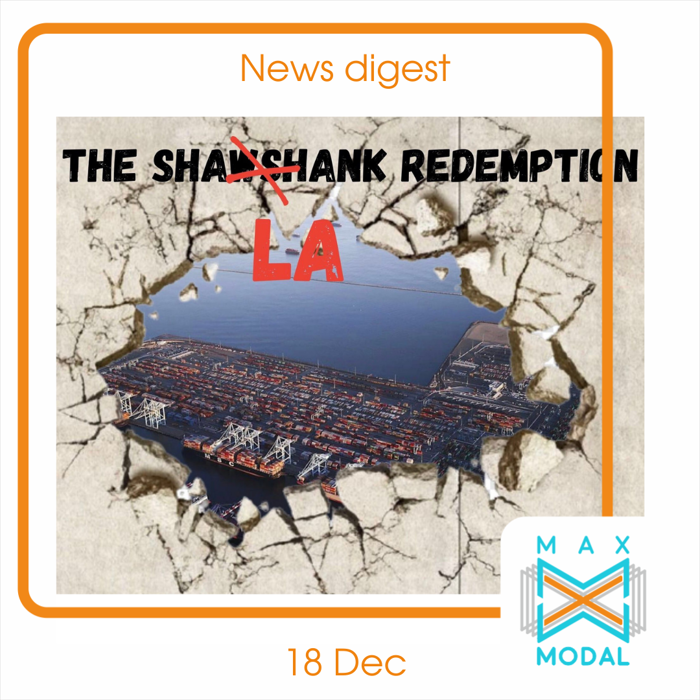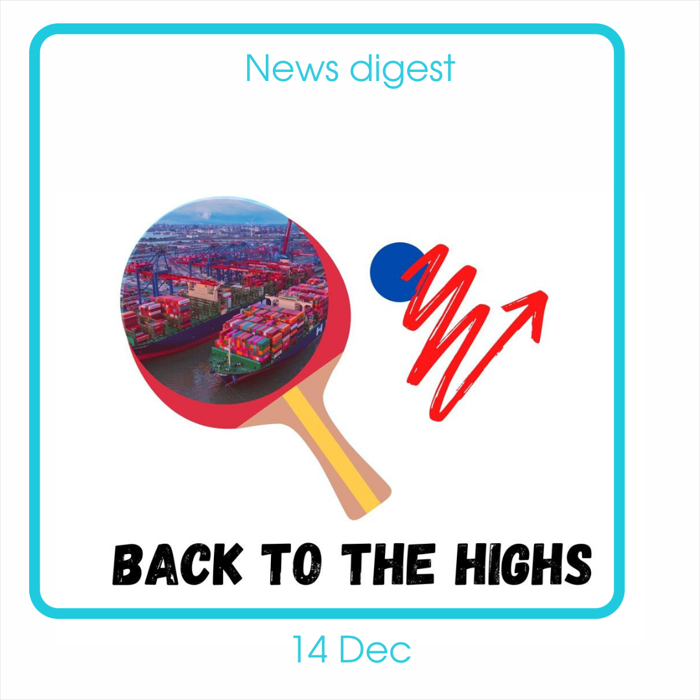With LA and Long Beach still being severely congested, many vessels are heading east. Will the reshuffling help or are we forever stuck in the circle of improvements and setbacks?
The tough context of newly increased rates and challenging negotiations over contracts (as capacity remains extremely tight ahead of holidays) has been forcing shipping lines to find ways to solve problems that would be less costly. For a while, they have been prioritizing import over export by turning empty containers to Asia so they can reload them with higher-yielding import loads to the U.S. As a result, agriculture companies, which are now dependent on foreign markets for profitability, were left behind trying to wait for their turn to unload. In the end, they were not able to break through international markets and demands. Just to illustrate the damage: a shocking 59% of containers left the US ports unattended with goods. However, the shipping lines’ party is not going to last as the American government is determined to tighten its control around the sector and thus it is pushing lines to treat export and import equally. To support this call, it has also proposed players divert their attention to other, less congested ports on the West Coast. East has also become the alternative – the updates show that imports to East/Gulf Coast ports rose 9.9%, proving that indeed many container ships are now escaping LA, but will it help improve the situation? No matter the efforts put to reduce congestion at Long Beach and Los Angeles, it seems like they are only adding more disruptions. The problem lies in the continued influx of ships that are overwhelming the capacity of the ports no matter on which coast they are located. Consequently, it is affecting the rates, and many believe that they will decrease only after ships will return to Asia. In turn, more realistic forecasts predict that contract rates are destined to be record-high in 2022 as there are already signs of it with China to North Europe early bids averaging $11,900 per FEU. The same will be true for airfreight where unprecedented momentum has hit the transpacific direction. The sky is the limit they say, so the spot rates reach almost $16/kg this week. With port congestion and demand remaining high, this monstrosity is expected to continue beyond Christmas.
Reshuffling the lines is not only American ports’ thing. The same is happening in the EU as congestion fever goes on. Felixstowe, Rotterdam, and Antwerp remain the black sheep with a high percentage of canceled calls. Companies report that as soon as they see pockets of improvements, they face new setbacks shortly thereafter. The Asian ports that are on the “omitted” list are no better. CMA CGM has taken Yantian and Hong Kong out of the Southbound rotation, while Port Louis and Honk Kong have left the Northbound rotation. To tackle the problem, some companies upgrade their intra-Asia network. MSC goes for Russia’s Far East by introducing a call to Petropavlovsk-Kamchatsky. The new service now connects Russia, north China, and South Korea. The company is also planning to expand its Asia – US Santana service. In the meantime, Pakistan is following a famous “better late than never” proverb and is going to develop its containership fleet. However, it is still uncertain how big it will be as none of the market researches has been conducted yet.
Russia becomes an important part of the network riddle not only in the shipping sector but rail too. The New Silk Role has already become the Holy Grail for development, so no wonder that more players hop on it. A joint venture consisting of Russia, Hungary, and Austria will take the role of freight forwarder and logistics provider on the famous route. The initiative is particularly important for Hungary where The East-West Gate terminal could in theory be the largest intermodal terminal of Europe, if infrastructure upgrades in Hungary are completed as planned. Meanwhile, rail is increasing its role in the UK where Tesco starts including refrigerated goods for the first time in its rail service, as it seeks to improve its environmental footprint. However, the improvement is overshadowed by the looming disaster regarding Brexit border delays. The grace period that was giving importers to prepare for full costs that are coming up thanks to the new policy is reaching its end and nobody has used it accordingly. The truckers are not ready for new rulesand currently, everyone is trying to find a scapegoat instead of looking for a solution. Is not it too late? In addition, UK van drivers will be required to get new international goods vehicle operating licenses if they want to travel back and forth to the EU in 2022. The drivers’ shortages have been a very painful issue in the UK for months and many fear that the problem will escalate again.

And just like that – the hopes for spot rates decline divert.
For a while, after spot rates plateaued, it seemed like a decline was lingering over the horizon. However, these days show that the shipping sector is up for a new spike. According to the new data, Asian rates were up 1.8% to 4,811 points, reversing previous declines. Experts comment that with growth in consumer spending, container rates and containership charter rates will remain elevated at least until Chinese New Year 2022. Shipping lines are saluting as for them it is good news – they are on track to earn a record $115bn to $120bn in profit in 2021. They also do not stop further expanding. Wan Hai Lines, the leader of box facilities efficiency, has broken its piggy bag with $320m inside for more for secondhand ship acquisitions. It now holds the 10th position in the rank of the largest container lines.
In the meantime, it has turned out that the reports on the state of congested ports in California might have been exaggerating the improvements. There are currently 101 boxships spreading out across thousands of miles of North American coastline, stretching deep into Mexico. The progress has been shadowed by the increasing dwell times at the major ports globally. In Europe, Rotterdam is reported to have an average 6.76 days export dwell time. Having assessed the potential damage, the port’s authorities are planning to invest in the facilities to boost competitiveness. The substance to this drive will be derived from the agreement on port tariffs for the next three years. The indexation of the port tariffs for 2022 amounts to 2.5%. These will then amount to 2.4% in 2023 and 2.3% in 2024. In addition, there will be a new inland port dues system amid to improve cybersecurity, especially regarding information exchange. While it is difficult to unload containers due to congestion, the weather also brings disruptions. In the Egyptian port of Alexandria, the storm caused the loss of three containers and some other boxes were dislodged and damaged during transit. A similar disaster took place in Kentucky where the train was derailed by a series of tornado storms. Normal operating procedures call for an immediate stop in the face of a tornado warning.
Italy hops on the train of rail development alongside its neighbors to push local products further in Europe. CLdN Cargo, operating directly from Italy, will focus on further developments partly thanks to the recent breakthrough of Swiss Alptransit rail infrastructure. It will also work on reducing its carbon footprint by investing in sustainable multimodal transport like rail and ro–ro shipping. Other players are also looking for ways to boost efficiency and avoid political clashes. The new China-Europe route will bypass Poland and Belarus and provide a rapid transit time (it is cut by half compared to the sea freight.) It will connect Beijing with Hamburg and other key western European freight hubs via St. Petersburg and become a needed alternative to ocean and air. It is extremely crucial, taking into account predictions for airfreight. The cargo charter demand is destined to remain strong in 2022. Preighters will stay as well because companies do not expect that passenger capacity will get back to the market that quickly. Finally, Omicron and potential future variants of the virus will have a global effect on capacity as they are going to delay a return to pre-pandemic international travel. All these factors are a clear sign for everyone who was looking for relief in the seasonal first quarter that it is most likely to be postponed.

Рекламный ролик о деятельности компании- https://yadi.sk/i/mHJLuLA_ikVdlQ
Николай, увидел, что Вы разместили сервис в профиле Москва-Южно-Сахалинск. Если будут вопросы по размещению самих тарифов - сообщите, пожалуйста (наверху есть кнопка "помощник MAX"). Буду рад помочь.
2021 has identified major themes and characters involved in the post-pandemic reality. What will their development look like in 2022? Here are the major takes.
Jingle all the way or does the coming year holds more mysteries and uncertainties than everyone expected? 2021 has not been easy and there have been several predominant themes occurring on the logistics and transportation arena: global congestion, enormous spot rates across all modes, capacity and equipment shortages, and increased influence of shipping lines. These are the characters of the modern play that we all will meet in 2022. Let’s dive in and highlight major forecasts. Spot rates are expected to jump in January which creates uncertainty for many shippers’ budgets. Their customers also want to know their freight costs. At the same time, on the transpacific, some indexes saw Asia-US components jump by 5% to the west coast, to $10,138 per 40ft, and by 4% for east coast ports, to $13,118. Supply chain disruptions will continue and the lead-time will remain long, however, the recent surveys indicate that the majority of the respondents anticipate improvements thanks to diversifying sourcing, holding more inventory to entering long-term contracts with carriers. In addition, сhanges will include leasing rules – one-way leasing will allow shippers to lease a container with extra flexibility by picking it up at one location and returning it at another. This approach is already taking place as the most sought-after alternative as compared with getting the equipment from the carriers. Will the new Ocean Shipping Reform Act alleviate current issues? It is now being criticized as strongly as it was anticipated. The Act mainly addresses unfair shipping practices and, according to critics, does not solve the issue of congestion, the most pressing problem nowadays. On the contrary, some believe it is only making things worse and US importers will end up being short on equipment and face prolonged high freight costs. The World Shipping Council has responded with the promise to continue working with Congress and come up with qualitative steps.
Everyone has their eyes on Maersk these days. The veil of rumors about Maersk possibly restricting some customers to spot bookings from 1 January has been lingering in the air for weeks now. No wonder that experts start toying with it and look at it from different angles. Not everything is expected to be negative. Some see it as an opportunity for smaller forwarders to win business from their multinational competitors. Maersk has been pushing everyone to online bookings and/or FAK rates that turn out to be more reliable named account contract rates and this is something big companies prefer not to announce to their customers. On the contrary, smaller forwarders are more transparent on this matter, thus they can compete for market shares and attract more customers.
While in the west the government decides to increase its influence, the east is choosing a different approach. The coming year will be the last one when Chinese industry players are the central place in subsidies on the New Silk Road. The decision is a consensus of the authorities and industry players that report that volumes are high and the rates competitive. If there is any form of financial support they need, it is for eastbound traffic, which is still less than westbound flows. The phase put will result in the train between Europe and China carrying less low-value goods. In general, there will be fewer shipments, and companies will be able to focus on quantity rather than quality. However, not all Chinese initiatives are expected to be fruitful. The country will no longer be accepting cargo in aircraft passengers which will keep air freight rates high. Only anti-epidemic-related items will be allowed to be loaded into the cabin. The consequences are already visible – some forwarders report that rates had risen 10%-15% this week. It is the highest ever rate level now.
Apart from all the challenges, the industry has recognized the potential of sustainable development for the future. Although the motives of the initiatives are widely different, many players have set ambitious goals. For instance, the UK is planning to make all new heavy goods vehicles zero-emission by 2040. Several other initiatives have been launched. This includes the World Bank’s Global Facility to Decarbonize Transport will mobilize $200 million over the next 10 years to support the decarbonization of road transport in emerging markets and developing economies. The drivers’ crisis has been the UK’s most painful issue this year when the road sector has lost almost all its attractiveness for the drivers. In 2022, the government will continue tackling this problem by funding training for HGV drivers with the aim of injecting 11,000 drivers across the country. The program will also focus on the development of their professional skills that will be necessary for the rapidly changing environment.

It is true that 2021 has not been a piece of cake for many. If there were a competition of the most severe misfortunes that the industry has faced, it would be almost impossible to choose the winner.
COVID-19 has been around for nearly two years and yet, lockdowns remain the primary measures that are being taken against it. A partial lockdown followed the spark of several cases of the virus in Ningbo, the world’s third-largest container port complex, putting more pressure on the already suffering supply chains. The global effect of the ports shut down earlier this year proved how important smooth operations of the international ports are. The same is true for congestion – overall, the three mega alliances have skipped a total of 383 port calls in North Europe over the past five months. Among the victims, the Port of Felixstowe has suffered the most by the temporary schedule changes and ad hoc adjustments with 32.5% fewer calls followed by Rotterdam, Antwerp, and Hamburg.
It seems like if there were a competition of the most severe misfortunes that face the industry, it would be almost impossible to choose the winner. However, experts believe that securing space on containerships will be the biggest challenge for the logistics sector going into 2022. The surveys reveal that the majority believe that the performance of the supply chains will remain low; therefore, they are already rethinking their strategies. To mitigate carrier equipment rationing, half of the respondents said they were resorting to organizing their own supply of boxes, opting for one-way leasing of containers. As for the consequences of the new variants of the COVID, three are yet to be assessed with time. In addition, berthing delays are resulting in a huge piling-up of export containers within port terminals and creating a big spike in container dwell times worldwide. The worst situation is in the US where Long Beach has outperformed Los Angeles, while Asian ports report decreases. Europe is the hybrid: with export, dwell times are not as bad as in the United States but not as good as in South East Asia and China. Not only American exports are experiencing a boom. In the meantime, the US imports are expected to total 26 million TEU, an increase of 18.3% over 2020 which is the highest number since 2002. At least it is somewhat good news, as customers will receive their goods right on time for the holidays. January 2022 is forecast at 2.24 million TEU, up 9% from January 2021 and the trend will most probably continue until the Q1 minimum. The persisting challenges have pushed the US government to revise provisions of the Ocean Shipping Reform Act 2021 taking into account complaints of the shippers that earlier the bill had not been properly debated. The provisions include some of FMC’s responsibilities and require ocean common carriers to adhere to minimum service standards that meet the public interest. Although these are good steps, the bill will do nothing to alleviate the major logjams being experienced in ports and rail. On the contrary, the lack of value in the government’s initiatives encourages big players to consolidate and expand their influence in the US and European markets. CMA CGM Group is planning to form the fourth largest contract logistics group. The acquisition of Ingram Micro’s Commerce & Lifecycle Services including Shipwire will cost $3 bn. Initially, the trend has started in China where the state has announced its intention to form a new state-owned logistics group to improve the nation’s international trade links.
By now everyone knows that the renewal of contracts brings shippers the most headache. While some big lines remain strong on their commitments to stick to long-term contracts and are losing clients as the result, others are more negotiable. Currently, container shipping remains an operator’s market, and the contractual rate for Asia-US west coast shipments is between $5,000 and $6,000 for a 40ft container, while to the east coast, it is around $8,000. The current crisis lifts old restrictions as well. Adani Port will re-start accepting containers from Iran, Afghanistan, and Pakistan.
While some European countries conclude that they do not invest enough in rail, France decides to make Strasbourg its operational leader. It is the country’s second biggest river port and in the coming years it will invest in its rail infrastructure to address increasing rail volumes. On top of the plans to expand rail infrastructure, the port of Strasbourg also aims to become a low emission zone. Ambitious plans also concern the Rhine-Alpine Corridor which the Interregional alliance wants to make a frontrunner in sustainability. The newly published roadmap focuses on alternative fueling stations, the elimination of capacity problems, and the analysis of the needed improvements in technology. However, it is difficult to beat the recent green development that occurred in the marine sector. Maersk keeps its leading positions and introduces the design of new revolutionary boxships that will allow a 20% improved energy efficiency per transported container. This example must have inspired Zéphyr & Borée to advance on the wind-assisted boxship project. An open-top 1,800 teu containership will become the example of using wind-propelled wing-sails on this type of vessel.

Another wave of fever in Asia. Will the disruption be as severe as before or has the industry learnt its lessons?
While the memories of the previous lockdowns and their aftermaths on supply chains worldwide are still fresh, there is now an increasing alert of the new cases. Not only Europe is putting up its armor but Asia as well with Ningbo upgrading the emergency responses to the highest level. The virus outbreaks already caused the disruption at the port earlier this ear and the ripples of it spread a lot more farther than Asia. Will history repeat itself or can the early measures help mitigate the risk of a shutdown? Experts believe that the new variations of the COVId-19 will emerge but to what extent they are going to affect global transportation is uncertain. Unknown variables also concern the carriers’ pricing behavior and how will the fact that the shipping sector is now more consolidated will influence the pace that rate changes with? Besides, the existing allies do not necessarily introduce positive changes. For instance, many Asian exports have found themselves lost and abandoned after Maersk decided to transform its ocean business and stopped accepting their bookings. As the result, the exporters have to go for deals with the giant’s rivals which is not a good alternative because now with short-term freight rates holding at highly elevated levels and new FAK ratesincreased by $2,600 and $3,850 per 20’ and 40’ containers respectively, operators are leaving no stone unturned to find extra loaders. In this case, operators of ad hoc sailings come into the spotlight, particularly from Asia to North Europe. Holding onto tonnage, they are being encouraged by buoyant demand and booking restrictions to make further round-trip voyages. Moreover, they advertise their ships well in advance. Meanwhile, the Port of LA and the Port of Long Beach have reported a combined decline of 37% in ageing cargo on the docks, so the authorities have again postponed the implementation of the dwell fees, this time until December 13.
Small import businesses are in the same boat. The new customs changes between the EU and the UK coming next year are going to be tough for many of them. The new policies will include full import controls for EU goods and the UK’s largest business group, Federation of Small Businesses is signaling a lack of capacity among small businesses to handle the adopted changes. COVID cases, Christmas rush, delays, etc. make a snowball of troubles, thus experts advise firms to ensure that they have all they need to make declarations through negotiations with suppliers, consider alternative providers if it is necessary, and think about different transportation routes. Most definitely, not by air as it is promising to be an expensive variant as rates keep increasing with Shanghai to North America rates topping $14/kg this week. Can England benefit from the New Silk Road since it has been the headliner of the majority rail advanced in Europe? Not so fast. The development of overland trade has very much failed to get its feet wet in the cold waters of the North Sea mostly due to administrative procedures. In addition, little to nothing has been done in the way of new rail traffic through the Channel Tunnel either. Is it the political relation to blame? The upcoming Silk Road Summit will unveil the current state of things. Meanwhile, mitigation of the pandemic effect remains a priority, and Spain is planning to extend the reduced track access charges in its budget most probably for the last time because after the rail law is renewed, the authorities will track these charges independently. Moreover, it is going to invest 24.2 bn euros in rail infrastructure over the next five years and advance the improvements in the Mediterranean Rail Freight Corridor. Building a sufficient web of rail connections is a part of The UAE Government’s agenda too. It has announced the launch of the UAE Railways Programme, linking Saudi Arabia to the Port of Fujairah. The project is promising to be tremendous as it will be the largest one to consolidate the strength of the union for the next fifty years. Sea Port of Saint-Petersburg can also be added to the list of those improving its operations. By the end of this year, it has upgraded its storage facilities, railway infrastructures, power-engineering facilities, and repaired its berths which resulted in added kilometers of new railways and construction of two new cargo yards.
China follows suit and spreads its influence farther in Europe thanks to the first eastbound train from Slovakia towards Xi’an using a cleaner route in terms of CO2 emissions. Overall, despite the growing concerns about the ocean freight sector due to the new virus outbreaks, China speeds up on its rail development and spans the merge of the state-owned rail companies in an attempt to secure its supply chain.
The freight haulage sorority is about to see the new leader of green technology and it will be Canadian National that will deploy a FLXdrive battery-electric freight locomotive, the first fully battery heavy-haul locomotive in continental North America. Competition intensifies as recently DSV has unveiled a “Green Logistics” planning to take a starring role in accelerating the green transition of the freight transport sector. The company has proposed four solutions adaptable across all major transport modes.

To find structure in chaos: the need for one digital space that would unite all parties from shippers to forwarders is stronger than ever.
With all the digitalization taking place, shippers start to experience not only the benefits of it but also come across obstacles such as the lack of structure and order in the sea of numerous apps that offer shipment services. Users start complaining that in order to have their cargo delivered, they have to engage with different platforms that, in turn, are in competition with each other, which means that they all want customers’ data and the agreement to it is a very delicate subject. The good news, the solution already exists and it not only solves the problem by uniting the shippers in one digital space but also by being functional and user-friendly. Sensing the new direction of the wind, some companies try to restrict their customers to the use of their platforms but the undermined trust — some clients end up getting discounted offers while others never hear about them — makes it difficult to win loyalty from them. Besides, when spot rates decrease, the big players still stick to the highly elevated rates that only repulses shippers. However, such companies as Maersk, which is almost losing its title of the world’s largest containerline since the mid-1990s, are determined to ruin the rumors about spurning forwarder bookings next year by introducing several types of the agreement for 2022. In the coming year, the company will be focused on direct shipper contact and provision of landside and services package. In addition, the extra volume and availability will also be subject to agreements to tackle the capacity shortage. The letter is essential for the restoration of normality especially when the US ports keep breaking records in handling cargo. Although shippers have found alternative ways of getting their goods to market by air and rail as well as by chattering their own vessels, the recovery is postponed because customers are not switching to services, as it would have been expected. Due to the high demand for goods, interest rate hikes and higher energy costs take their toll on discretionary spending. As for congestion, the Port of LA and the Port of Long Beach finally report significant improvements, in particular related to the environment — the new queuing process has enabled slow-speed-steaming, increasing safety and air quality. The results have allowed the government to report that the US is ready for the holiday rush which is hopeful after such a turbulent season.
On the other side, there are forwarders who are also dissatisfied with the “unreasonable” expectations of their counterparts. Cargo transportation is new torture with all parties involved complaining about each other, especially in the air freight sector. The rates are changing so quickly that for small forwarders it is difficult to keep their allocations on the market. There is a great problem of communication as well: opening-up passenger markets over the transatlantic only reduced the capacity (as it was taken by luggage instead of cargo) and that is something shippers did not understand — a classic “expectations vs reality” case. Meanwhile, the situation regarding air freight rates is not calming. The updates show that the ones from Shanghai to the US climbed 15-20% in November. Europe-US East Coast rates increased 10% over the month to $5.45/kg, with rates to the Midwest and West Coast climbing as well.
With the new German government tapping into responsibilities, the possibility of splitting DB into two entities for the sake of transparency that was lingering in the air for a while has not found its continuation. The company has been criticized for its service and now when the decision of restructuring it is no longer in focus, it has to find new ways for improvement. In the meantime, the New Silk Road has no intentions to be on the lookout for improvement as it is already developing at an impressive pace where the Middle and South Silk Road corridor plays the key role. Their future will be one of the topics for discussion during the upcoming European Silk Road Summit in Amsterdam. The initiative is dedicate to a cross-party forum to promote discussion and investment in all modes of transport across the North of England will also take place in the UK. By the end of the year, it is especially crucial to underline what has already been achieved and what prospects are looming over the horizon. Intermodal development is one of them and there are concerns that the EU is not pushing hard enough. Standardization and digitalization initiatives are named as the primary tools for achieving sufficient competitiveness. Zero-carbon future will also be on the upcoming agenda in Brussels.








